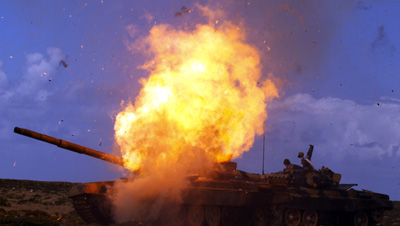New York, March 20, 2011–Al-Jazeera said today that Libyan authorities have been holding four of its journalists in Tripoli for several days, while Agence-France Presse reported that two of its journalists and a third journalist are missing in eastern Libya. On Saturday, the founder and manager of a Libyan online broadcaster was killed by gunfire while reporting from a battle outside Benghazi. The Committee to Protect Journalists condemns the ongoing attacks on the press in Libya, and calls on authorities to immediately release all journalists in custody.
In a statement, Al-Jazeera said that correspondents Ahmed Vall Ould Addin and Lotfi al-Messaoudi, and cameramen Kamel Atalua and Ammar al-Hamdan, were detained by Libyan authorities as they reported on the conflict from western Libya. The Al-Jazeera statement did not specify the date of the detentions, but managers told CPJ they occurred a few days ago.
The Qatar-based news channel said it holds Qaddafi’s regime responsible for the safety and well-being of the four journalists and called on authorities to release them without delay. News of the detentions comes as U.S. and European forces have begun waging airstrikes against Qaddafi’s military in an effort to impose a U.N.-approved no-fly zone.
On Tuesday, Libyan authorities detained four New York Times journalists. Saif al-Islam Qaddafi, son of leader Muammar Qaddafi, told ABC’s Christiane Amanpour in an interview last week that the four Times journalists would be released shortly. No further developments have been reported, however.
At least six local journalists who spoke critically of government policies remain missing amid wide speculation that they are in the custody of forces loyal to Qaddafi. Three of the six went missing shortly after speaking to Al-Jazeera on the air. Journalists working for the BBC, London’s Guardian, and numerous other media outlets have also been detained for periods of time before being released.
“The authorities in Tripoli must release all journalists in detention immediately,” said Mohamed Abdel Dayem, CPJ’s Middle East and North Africa program coordinator.
Agence France-Presse reported today that AFP journalists Dave Clark and Roberto Schmidt, and Getty Images photographer Joe Raedle are unaccounted for. AFP said the journalists were last heard from via email on Friday night, as they were about to drive out of the eastern city of Tobruk.
Since Libya’s revolt began in February, CPJ has documented more than 50 attacks on the press, including two fatalities, more than 33 detentions, five assaults, two attacks on news facilities, numerous instances of equipment confiscation, three cases of obstruction, the jamming of at least two satellite news transmissions, and the interruption of Internet service. (Click here for CPJ’s running account of all attacks on the press in Libya.)
On Saturday, Mohammed al-Nabbous, founder and primary operator of the online opposition broadcaster Libya Al-Hurra TV, was killed by sniper fire while he was covering a battle in the vicinity of Benghazi, The Associated Press and regional news websites reported. (Al-Nabbous’ last report was abruptly interrupted as he was apparently hit by fire.) Libya Al-Hurra had been broadcasting live footage and political commentary from Libya since mid-February.
This marks the second media fatality in Libya in a week. On March 12, Al-Jazeera cameraman Ali Hassan al-Jaber was fatally shot when his crew was ambushed by suspected pro-Qaddafi security forces on a highway near Benghazi. A second Al-Jazeera journalist was wounded. Six media fatalities have occurred in the Middle East and North Africa in all this year: one in Tunisia, one in Egypt, one in Iraq, one in Yemen, and two in Libya.
The Libyan Authority for External Communications, a government body responsible for regulating the work of international media, said that Libya is not responsible for the safety of foreign journalists who enter the country without following procedures that include government permission and supervision. “[Libya] does not bear any legal or ethical responsibility for any harm that might befall media,” a statement by the regulatory body said. In a separate statement, Libya’s deputy foreign minister, Khalid Kaim, said journalists who enter the country “illegally” would be treated as “outlaws” and “al-Qaeda collaborators.”
“We send our condolences to the family and friends of our colleague Mohammad al-Nabbous,” said CPJ’s Abdel Dayem “The Libyan government must immediately desist from resorting to menacing rhetoric with regard to journalists, targeting them, or detaining them arbitrarily.”
